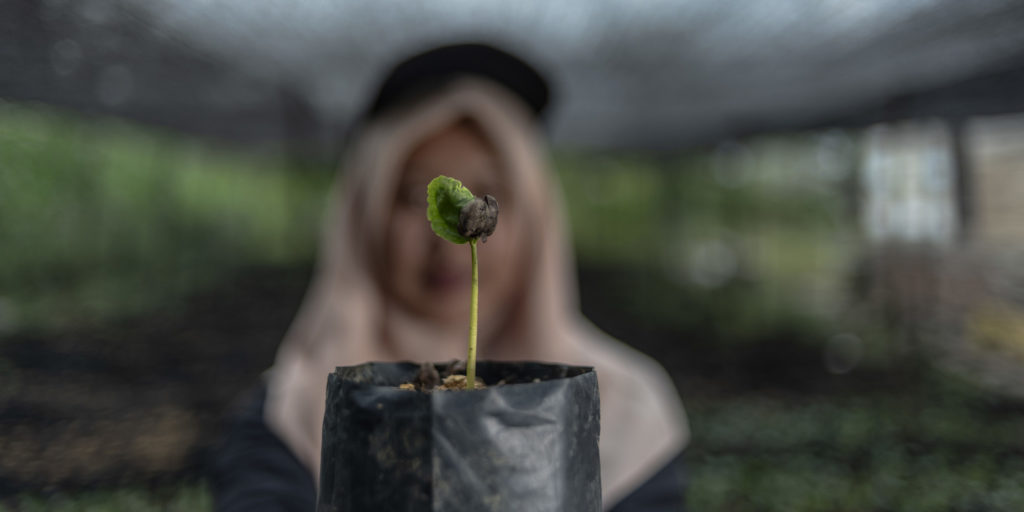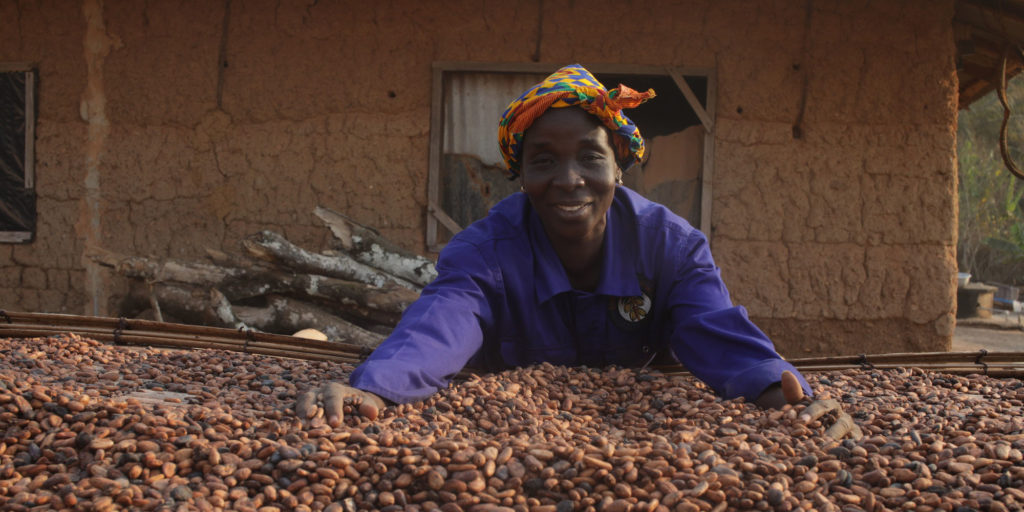When you partner with Fairtrade, you want to know that your business has a positive impact for farmers and workers and the world as a whole. Here are some of the ways the Fairtrade system and the farmers within it have made a positive impact.
Decent livelihoods and living wage
80% of people living in extreme poverty are dependent on agriculture. The Fairtrade Minimum Price and Premium provide important price protection and additional funds to farmers and workers.
Find out more about the Fairtrade Minimum Price and Premium
Since 2017, Fairtrade farmers have received over 180 million euros in Fairtrade Premium per year. 18% of this is spent against the sustainable development goal zero poverty, including things like direct cash payments, loans and emergency payments to members.
The Fairtrade Standards incorporate mechanisms to support employees, such as establishing floor wages, requiring incremental wage increases, and worker organisation for collective bargaining.
Fairtrade developed the Living Income Reference Price, which indicates the price needed for farmers to earn a living income.
Fairtrade also co-founded the Global Living Wage Coalition and supports the development of living wage benchmarks for specific countries and regions. These benchmarks help us to see the gap with current wages and find solutions together with employers, workers, buyers and retailers.
Find out more about the Fairtrade Standards
Find out more about the Living Income Reference Price
Find out more about the Global Living Wage Coalition
Climate change and environment
Climate change is having devastating effects for farmers. Increased rainfall, droughts and temperature changes can lead to decreasing soil quality, erosion or crop disease. This makes the land less productive with lower yields, and may even become unsuitable for the crop. Decreased income leads many farmers to expand their farming area or displace crops to other areas. This vicious cycle leads to increased likelihood of deforestation and impact on biodiversity.
Fairtrade Standards, which all Fairtrade-certified farmers follow, encourage environmental protection by encompassing measures covering chemical use, soil fertility, water, deforestation, biodiversity, and waste.
Offering technical support to build farmers’ skills and knowledge is also crucial. We provide free training and financial support, to produce more resilient crops, and help farmers adapt, mitigate and become more resilient to the effects of climate change.

In 2017/18, over £8.7 million of Fairtrade Premium was spent on projects with an environmental impact. These include clean water and sanitation facilities, composting programmes, crop diversification programmes, investment in energy infrastructure, community environmental programmes and farmer training in pest management, product quality improvement, productivity improvement, soil management and water management.
Gender equality
Studies show that while women’s participation in farming has increased over time, women have less access to resources such as land, inputs, information, credit and training. Fairtrade Standards are designed to increase female participation and empower more women and girls to access the benefits of Fairtrade.
Find out more about Fairtrade’s gender strategy
The Fairtrade Standards encompass requirements including no discrimination based on gender or marital status, zero tolerance of abusive or exploitative behaviour, developing a gender policy, and programmes to support disadvantaged and minority groups.
Producer networks are rolling out women’s schools of leadership, enabling women to learn business, negotiation and finance skills. Many of the women go on to take on leadership and committee positions within their co-operatives and communities.

Read more about the women’s schools of leadership
Since its launch in 2018, the Fairtrade Women’s School of Leadership in Côte d’Ivoire has reached 800 women, increasing female leadership and confidence in farming communities.
Human rights and environmental due diligence (HREDD)
Fairtrade can offer invaluable HREDD support for companies. Steps we take include:
- Understanding the human rights challenges in the supply chain
- Information and opportunities for dialogue with farmers and workers
- Support for farmers and other supply chain actors to prevent and mitigate adverse human rights and environmental challenges
- Follow up corrective measures for actors
- Data and analysis on results
- Remediation of child labour, forced labour and gender-based violence.
The Fairtrade model particularly focuses on:
- Living wages and living incomes
- Child labour, forced labour and gender-based violence discrimination based on gender, ethnic origin or other status freedom of association and unionisation
- Conditions of work
- Environmental rights.
In addition to supporting farmers and businesses, Fairtrade also advocates for mandatory human rights and environmental due diligence. Fairtrade believes living wage is a human right and vital to addressing human rights issues. We call for living income to be a key part of HREDD legislation.
Research shows that Fairtrade’s holistic approach strengthens farmers’ and workers’ say and livelihoods in global supply chains. Fairtrade:
- Strengthens smallholder farmers’ co-operatives – their organisational capacity and, in particular, representation and democracy
- Improves farmers’ income, wellbeing and resilience
- Improves workers’ health and safety, payment terms and job satisfaction
- Enhances women’s representation and participation and, especially on estates, equality of pay
- Raises consumers’ awareness, commitment and willingness to pay for fair and sustainable consumption.
Tracing Fairtrade’s Impact: a review of recent evidence (2021)
Child labour and forced labour
Fairtrade is committed to fighting the root causes of child labour and preventing abuse and exploitation of children. Working with Fairtrade encompasses a holistic approach which mitigates business risk of child labour within the supply chain.
Poverty is the main cause of child labour, and the Fairtrade Minimum Price and Premium provides important additional funds to farmers and workers.
Fairtrade Standards prohibit child labour as defined by the International Labour Organization (ILO).
Through Fairtrade’s producer networks and auditor, Flocert, we can identify areas of high risk and support producers to develop action plans and programmes to remediate against child labour.
Fairtrade guarantees that if we find breaches of our child labour requirements, we take immediate action to protect the impacted child or children.
Fairtrade views forced labour, and any form of exploitation and abuse, as totally unacceptable. Fairtrade Standards encompass strong entry requirements based on ILO conventions on forced labour as well as the UN protocol to prevent trafficking.
Standards alone are not enough to address the often-hidden practice of forced labour. We also support producers to develop preventative measures in areas of high risk and provide free training to farmers and workers on human rights topics. For a powerful example, have a look at our work with partners in Belize.
Photo: Grace, a worker at Karen Roses Limited in Kenya (2020)
Get in touch
Enquiries
This page is currently under maintenance.
We apologise for any inconvenience caused.
